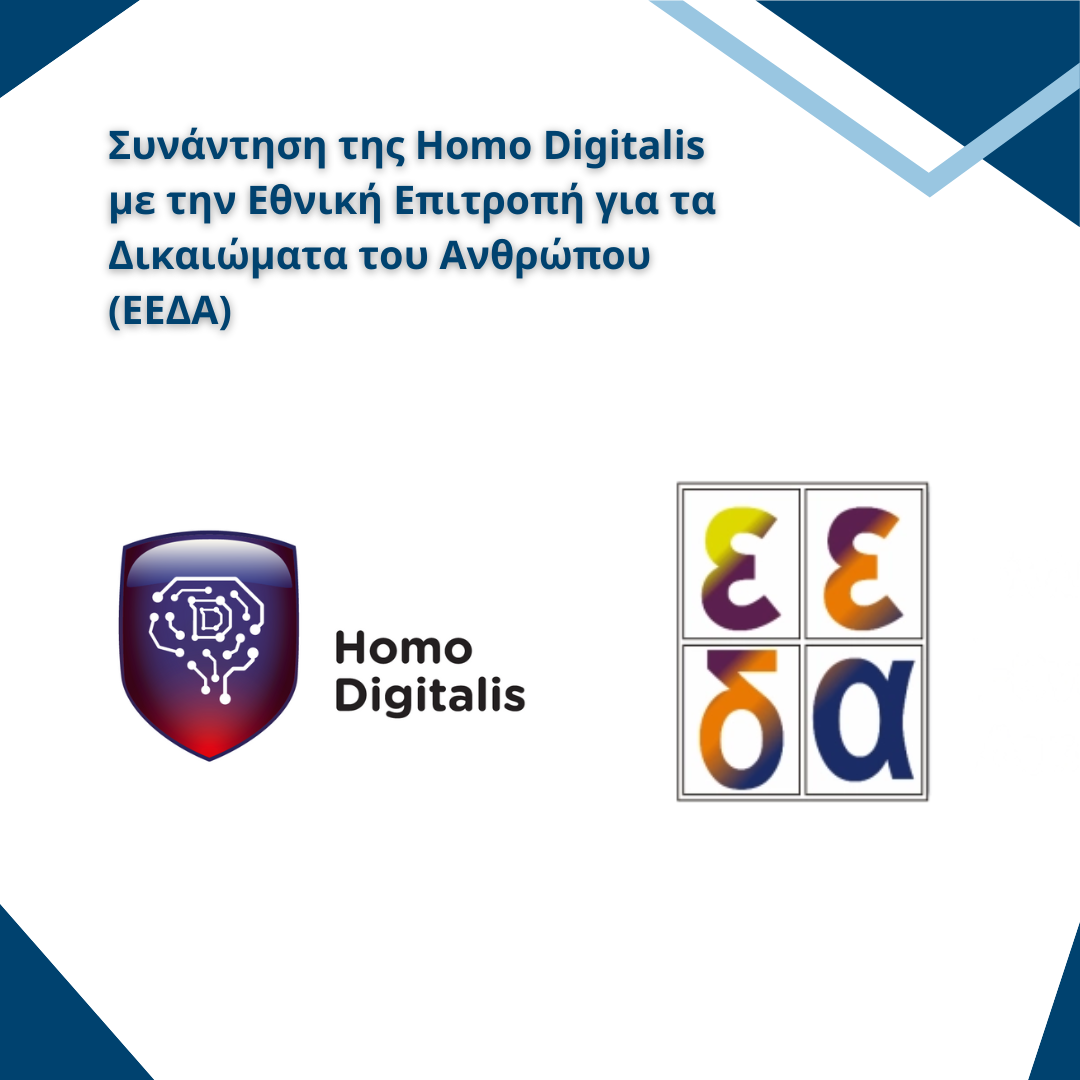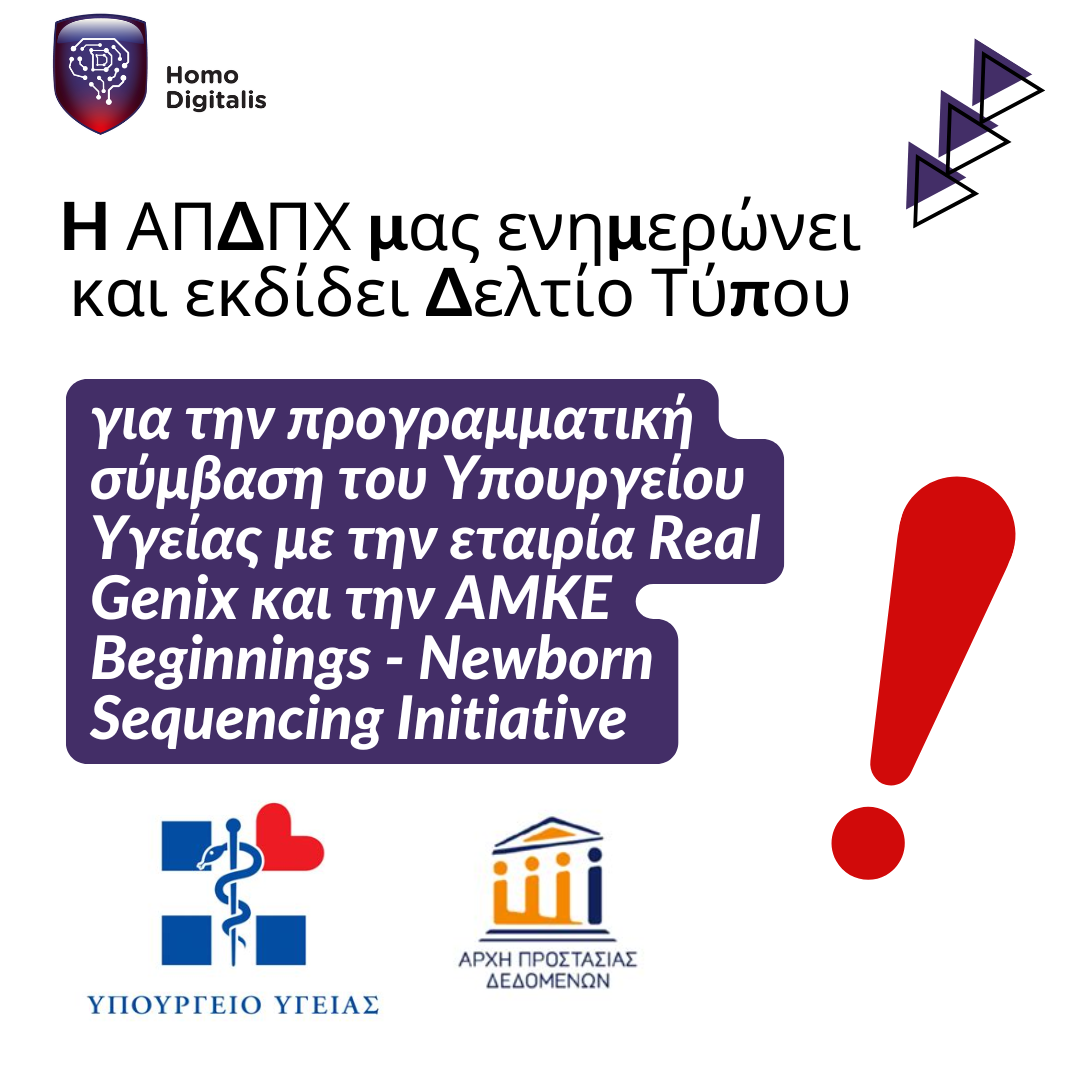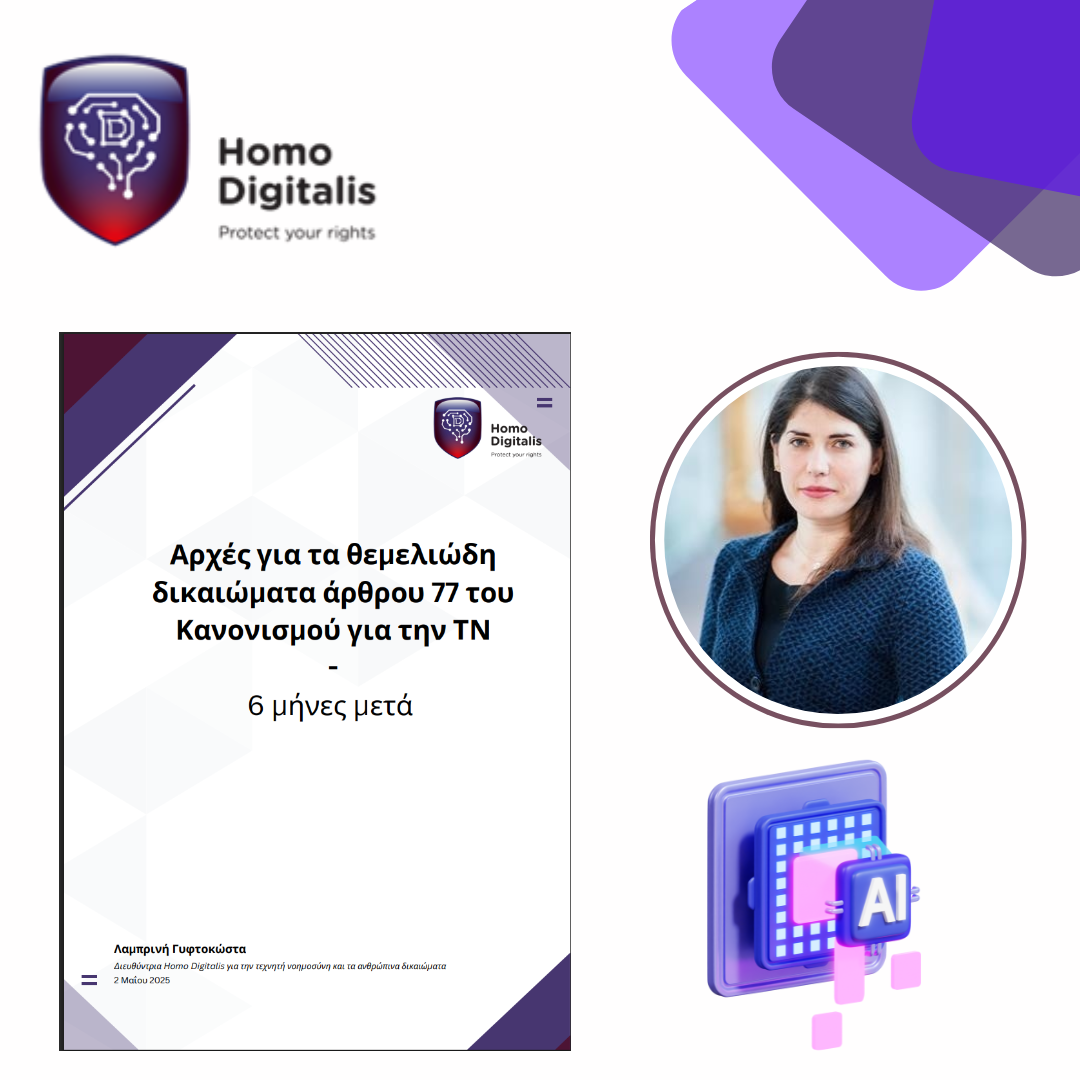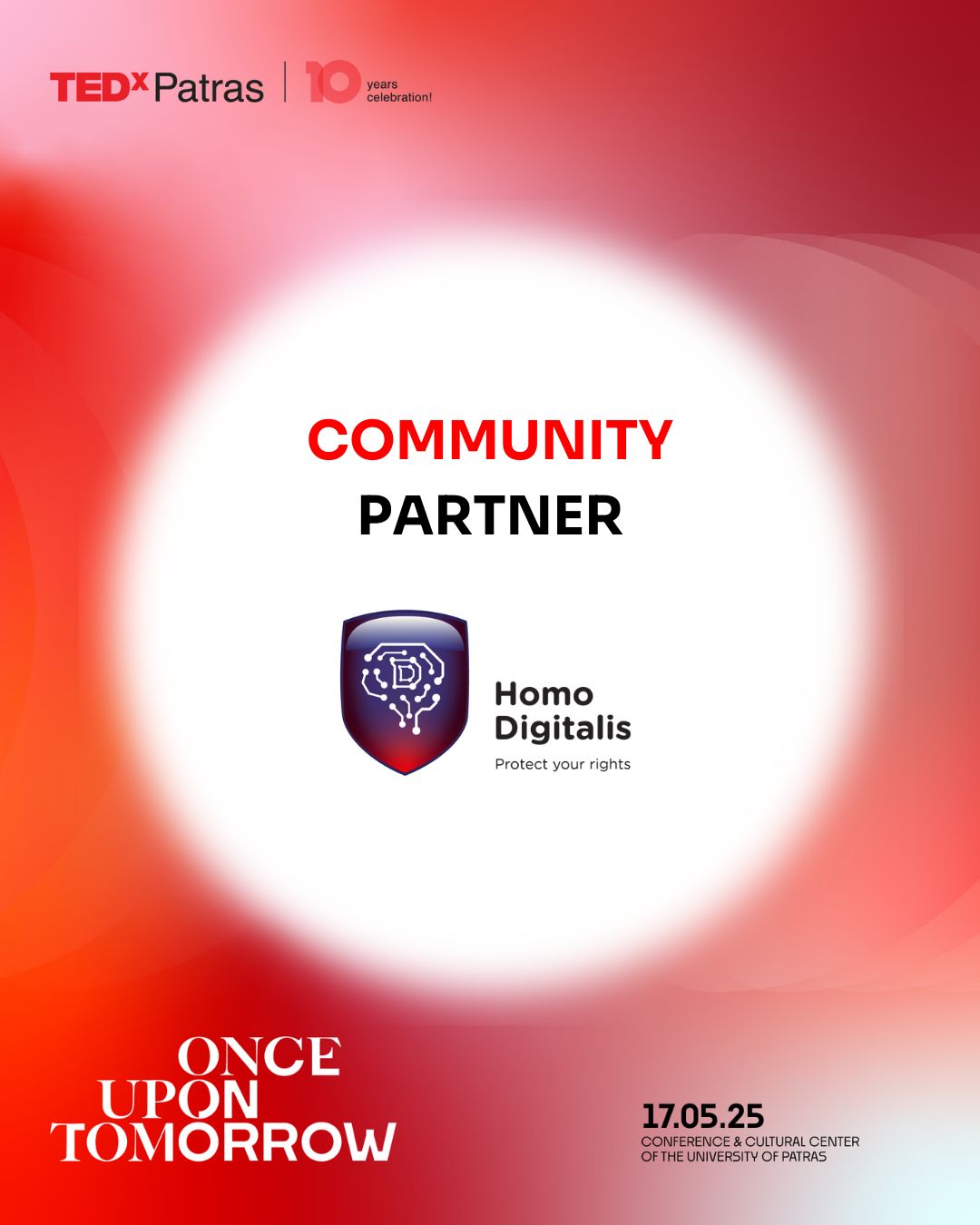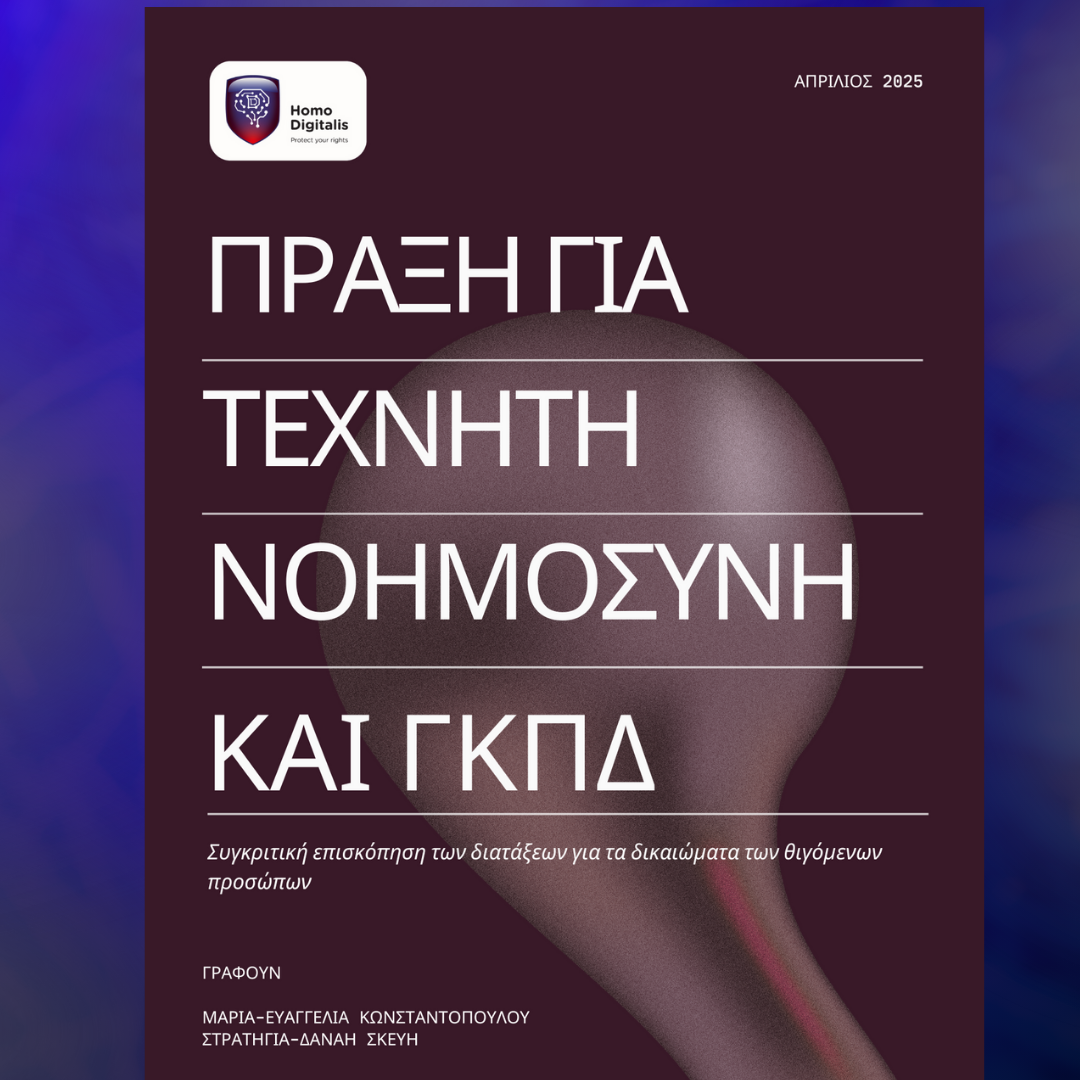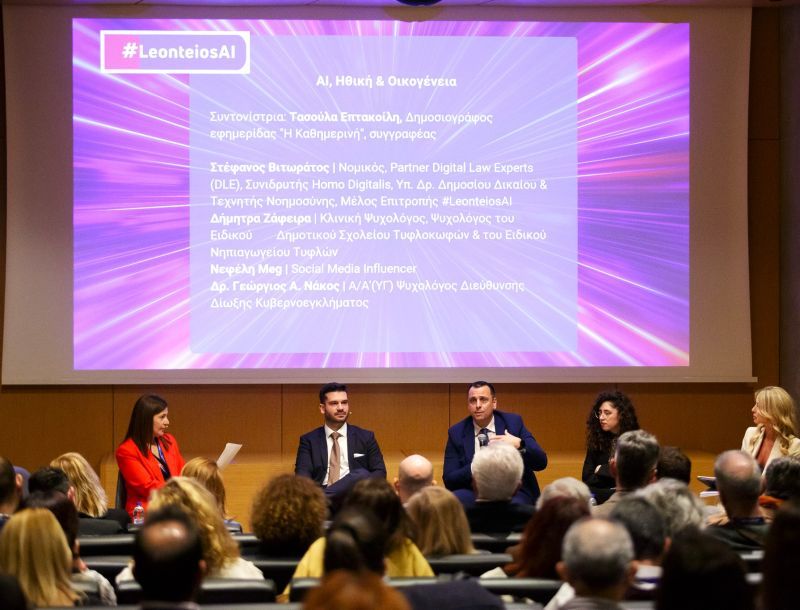Homo Digitalis meets with the National Commissioner for Human Rights (NCHR)
The Greek National Commission for Human Rights (GNCHR) welcomed the NGO Homo Digitalis to its offices on May 13, 2025, for a meeting focused on digital rights and artificial intelligence.
Among other topics, the discussion covered recent developments in the field of emerging technologies, the EU Artificial Intelligence Act and its implementation, as well as the role of the GNCHR under the Regulation, following its designation as one of the authorities referred to in Article 77 (Powers of Fundamental Rights Monitoring Authorities).
Participants in the meeting included Professor Maria Gavouneli, President of the GNCHR, Elli Varchalama, Second Vice-President of the GNCHR, Dr. Christos Tsevas, Special Scientist, Eleftherios Chelioudakis, Co-Founder and Executive Director of Homo Digitalis and Lambrini Gyftokosta, Director of Human Rights & Artificial Intelligence at Homo Digitalis.
Homo Digitalis speaks at Digital World Summit Greece
Speaker Announcement | Digital World Summit Greece 2025 – 22/05/2025
We are pleased to announce that Stefanos Vitoratos will represent Homo Digitalis as a speaker on the second panel of Digital World Summit Greece 2025, titled:
“The Future of Artificial Intelligence: The Next Decade in AI Development and Best Practices.”
Register here to attend the conference for free, either in person at Technopolis City of Athens or online.
Stefanos Vitoratos is a Co-founder of Homo Digitalis and Managing Partner at Digital Law Experts (DLE), specializing in data protection compliance, cybersecurity, and artificial intelligence.
He is a member of the European Data Protection Board (EDPB) Pool of Experts for Greece, Co-Chair of the Hellenic Knowledgenet Chapter of the International Association of Privacy Professionals (IAPP), and has been awarded the title Fellow of Information Privacy (FIP) by IAPP, holding both CIPP/E and CIPM certifications.
He is also a member of the Research Group of the Center for AI & Digital Policy (CAIDP) and collaborates with the European Commission as an Ethics Expert for funded projects. In the past, he has served as a consultant for leading companies in Greece as well as at the Permanent Representation of Greece to NATO.
In parallel, he is pursuing his academic path as a PhD Candidate in the Department of Public Administration at Panteion University, focusing on AI in public administration and public-private cooperation in relevant projects. He holds a Law degree from the National and Kapodistrian University of Athens, and two Master’s degrees from City, University of London and Panteion University.
He frequently delivers professional seminars, publishes scholarly articles, and participates in academic conferences as a speaker or moderator.
Homo Digitalis at Startup Europe Week 2025 of JOIST Park
Στις 13 Μαΐου, σε περιμένουμε στο JOIST Innovation Park, εκεί όπου η καινοτομία συναντά τις ευκαιρίες.
Το φετινό event συγκεντρώνει πρωτοπόρους στην τεχνητή νοημοσύνη, την κυβερνοασφάλεια, την επιστημονική έρευνα και την επιχειρηματικότητα χωρίς σύνορα – για μια ημέρα γεμάτη τολμηρές ιδέες και ουσιαστικό αντίκτυπο.
Τι περιλαμβάνει το πρόγραμμα;
AI, Cybersecurity, and the Future of Startups
• Λαμπρινή Γυφτοκώστα – Homo Digitalis
• Αναστάσιος Αραμπατζής – Ειδικός Κυβερνοασφάλειας
• Παναγιώτης Πιέρρος – TicTac S.A.
Bridging the Gap: Turning European Scientific Research into Startups
• Ιωάννης Κουρούτζης – Πανεπιστήμιο Θεσσαλίας
• Φώτης Τέκος – Foodoxys / Olea Fortius
• Κέλλυ Παπαδοπούλου – Pi tech
• Κωνσταντίνος Ακρίβος – Indeex
Scaling Startups Across Borders in Europe
• Λάμπρος Κούρτης – Επενδυτής & Μέλος VC
• Manuel Seuffert – IMP³ROVE Academy
• Αχιλλέας Μπαρλάς – Enterprise Europe Network Hellas
Είσαι έτοιμος να συνδεθείς με το ευρωπαϊκό startup οικοσύστημα;
Κάνε εγγραφή εδω.
Developments Regarding the Programmatic Agreement Between the Ministry of Health and Private Entities Concerning the Provision of Newborns’ Genetic Material
There are new developments concerning the significant revelations published by Reporters United in early April, regarding the programmatic agreement between the Ministry of Health and private entities, which involves the provision of newborns’ genetic material for testing purposes and the potential creation of a biobank—as well as the complaint submitted by Homo Digitalis to the Hellenic Data Protection Authority (HDPA) on the matter.
On Friday, May 9, the HDPA issued a press release, stating that it has taken up the case and is awaiting the Ministry of Health’s response to a relevant official document it has sent.
On the same day, the Advisory and Compliance Tools Department of the HDPA, following up on our communication on April 25, informed Homo Digitalis that the case is currently under preliminary investigation, based on Article 57(1)(a) and (h) of the GDPR.
According to these provisions, the HDPA monitors and enforces the application of the GDPR in Greece and may conduct investigations, including those based on information received from other supervisory or public authorities.
To further raise awareness about the challenges arising from the processing of genetic data, our member Anastasios Arampatzis has prepared an article on the 23andMe case in the U.S., describing the events surrounding a major data breach affecting approximately 6.9 million users.
Homo Digitalis is once again participating in the Digital World Summit Greece "AI Realities: Policy, Possibilities, Power"
The Digital World Summit Greece returns in 2025, taking place in Athens on Thursday, May 22, to shape the ongoing discussion around the developments and realities of Artificial Intelligence at a technological, political, social, and cultural level.
This year’s conference focuses on three key pillars:
Opportunities and challenges for Greece as a hotspot of technological advancement
The next steps in AI evolution and best practices
Safe development and use of Artificial Intelligence
Renowned speakers and representatives from the government, private and public sector, civil society, as well as the technical and academic community, will gather to discuss and propose solutions regarding crucial aspects of AI use and governance at national, European, and global levels.
The event will conclude with networking drinks.
Thursday, May 22 | 10:00–18:30 at Technopolis City of Athens– “Miltiadis Evert” Amphitheatre & Online
Free admission (registration required). Secure your spot and help shape the Future of Artificial Intelligence here.
Stay tuned to Digital World Summit Greece‘s channels for more updates on themes and speakers!
Article 77 of the AI Act: 6 months after the designation of the Fundamental Rights Authorities
On the first official deadline set by the Artificial Intelligence Regulation (AI Act), it required member states to appoint one or more authorities in accordance with Article 77 for the protection of fundamental rights by November 2, 2024.
Today, May 2, 2025 — six months after the deadline — 25 out of the 27 European countries have appointed a total of 210 authorities, a number that seems staggering and at the same time sends a strong message about how seriously these countries take the issue of fundamental rights. But does it reflect reality?
With this brief study, we aim to provide answers to the following questions:
What is the purpose of Article 77 of the AI Regulation?
Which authorities have been appointed by the member states to date?
What powers does the AI Regulation actually grant to these regulatory authorities, and what obligations arise from Article 78 of the AI Regulation regarding the confidentiality of information?
Who are the four national authorities that have taken on this role, what are their existing and new powers under the AI Regulation?
Through a case study, our Director on Fundamental Rights and AI, Lamprini Gyftokosta, attempts to explore how these authorities will cooperate, while also raising some questions that will undoubtedly concern us over time.
You can read our study here (EL).
Homo Digitalis at TEDx Patras
TEDxPatras returns for its 10th anniversary edition, bringing to the forefront powerful ideas, innovative approaches, and experiences that reshape the way we view the future, under the theme “Once Upon Tomorrow.”
On Saturday, May 17, 2025, the Conference and Cultural Center of the University of Patras will host the largest TEDxPatras event to date, featuring a unique program that includes renowned speakers, interactive workshops, networking hubs, and original experiences for all participants.
Homo Digitalis is proud to participate in this year’s event as a Community Partner, and we are excited to be hosting a dedicated workshop presenting the mission of NGI TALER!
The goal of the workshop is to explain the challenges in digital payments and the solutions offered by the NGI TALER payment tool, as well as to highlight funding opportunities available through the NGI – Next Generation Internet programs.
Our representatives at the event will be Eleftherios Chelioudakis and Alexandra Giannopoulou.
We warmly thank the organizing team for the kind invitation and the great collaboration!
Book your ticket here.
More information about the workshop available here.
We publish our 4th Study on the AI ACT – Comparative overview of the provisions on the rights of affected individuals
Today, April 11, 2025, Homo Digitalis publishes its fourth study on the provisions of Regulation 2024/1689 on Artificial Intelligence (AI), widely known as the AI Act.
This study focuses on the right to explanation and the right of individuals not to be subject to automated decision-making.
Specifically, the use of artificial intelligence systems for making automated decisions is continuously expanding in both the public and private sectors, with significant impacts on the individuals subjected to them.
Therefore, this study examines the legal remedies available to individuals affected by decisions made through the use of AI. The analysis focuses on the right to an explanation of individual decision-making as provided in Article 86 of Regulation 2024/1689. However, since the protection of affected individuals is not limited solely to these provisions, the analysis extends to the right to contest individual decision-making, which—under appropriate interpretation—is based on Article 22 of Regulation 2016/679, known as the GDPR.
The study’s authors are two distinguished legal professionals and volunteer members of Homo Digitalis: Maria-Evangelia Konstantopoulou and Stratygia-Danai Skevi (listed alphabetically).
You can read our 4th study here.
We remind you that we have published three previous studies on Regulation 2024/1689 and its transposition into the Greek legal order: in October (impact assessment on fundamental rights), November (AI governance and competent supervisory authorities), and December (prohibited practices) of 2024, respectively.
This intensive effort aims to contribute constructively to the public dialogue in Greece and at the EU level in the field of artificial intelligence, and it is the result of significant support from the European Artificial Intelligence & Society Fund.
We successfully participated at the panel "AI, Ethics & Family" at the event organized by the Leonteios School Network
Another proud moment! Our co-founder Stefanos Vitoratos and partner at Digital Law Experts (DLE) participated earlier the previous week, in the LeonteiosAI- Shaping the world of education Conference held at the iconic Acropolis Museum, as a Leonteios School Athens alumni and a member of the LeonteiosAI Committee!
Stefanos has contributed to the initiative on adopting AI as part of the school’s educational procedure. Heartfelt thanks to the organizers and committee members for assembling such an inspiring and forward-thinking group of professionals.
